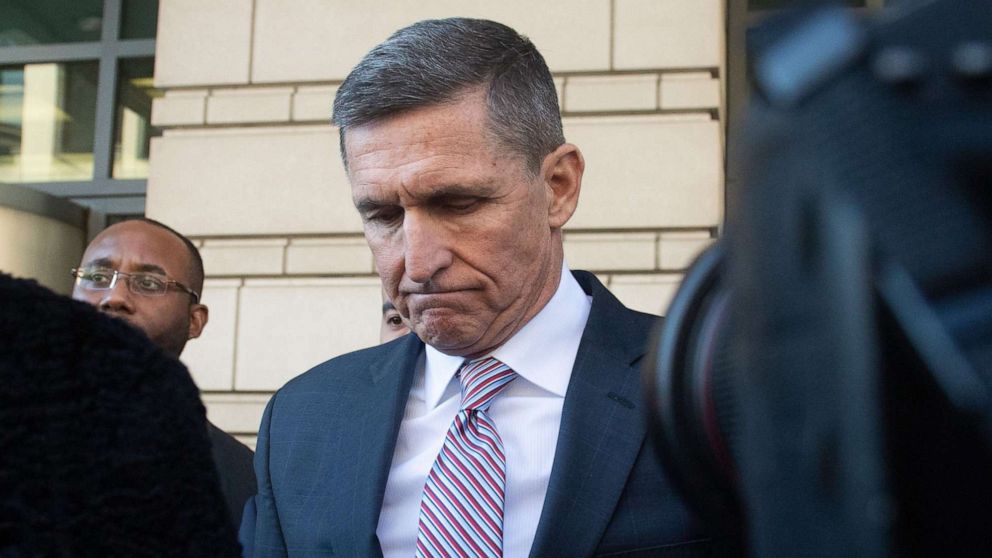Appeals court holds rehearing on DOJ effort to drop Flynn case
A federal appeals court Tuesday heard arguments over whether a district judge overstepped his authority by not initially accepting the Justice Department's controversial push to drop its criminal case against former national security adviser Michael Flynn.
Late last month, the full D.C. Circuit Court of Appeals threw out a three-judge panel's 2-1 ruling that would have ordered D.C. District Judge Emmet Sullivan to accept the Justice Department's request to drop the case.
In Tuesday's hearing, though, several judges appeared to express concern over taking the extraordinary step of intervening in the case before Sullivan holds a scheduled hearing to consider arguments on the DOJ's motion.
"It's the core of any judge's job to assess cases and view the strongest arguments that can be made on both sides," D.C. Circuit Judge Cornelia Pillard said, in an exchange with Flynn's attorney Sidney Powell. "Your position is, 'no,' he can't hear both sides from the law he has to drop the case like a hot potato without adversary closing argument."

Flynn pleaded guilty in 2017 to lying to the FBI about his contacts with the Russian ambassador during the presidential transition, but later sought to reverse his plea alleging wrongdoing by the agents who interviewed him. Attorney General William Barr earlier this year moved to drop the case after he said a review uncovered evidence that undercut the legitimacy of the FBI's investigation into Flynn at the time of his interview.
In Tuesday's hearing, acting Solicitor General Jeffrey Wall revealed Barr's motivation for seeking to drop the case was based on information that has been made public as well as other certain "undisclosed" information.
"The attorney general based that decision or that judgment on the basis of lots of information, some of it is public and fleshed out in the motion and some of it is not," Wall said.
Barr has previously said the review of Flynn's case is incorporated at least in part in a broader investigation by U.S. attorney John Durham into the origins of the Russia probe.
The DOJ and Flynn's legal team have since accused Sullivan of impropriety in his appointment of an outside former judge tasked with presenting arguments against the Justice Department, as well as evaluating whether Flynn may have committed perjury by revoking his previous guilty plea.
"General Flynn is a defendant without a prosecutor," Flynn's attorney Sidney Powell said Tuesday. "Only the Department of Justice can decide the public interest and myriad factors inherent in pursuing a prosecution."
Powell argued that the court should not simply overrule Sullivan, but ensure he has no further involvement in overseeing Flynn's case moving forward.
"There are no circumstances now under which Judge Sullivan can continue on this case because his bias demands his disqualification and just the very appearance of bias is enough to demand his disqualification," Powell said.
At times she received skeptical responses from judges on the panel, including D.C. Circuit Judge Thomas Griffith who said that it wasn't a judge's job to simply be a "rubber stamp" when an interested party puts forward a motion, like the Justice Department did when it sought to drop the case.
"Do you have a strong case?" Griffith said. "In that case, why not simply appeal [if Sullivan decides not to dismiss the case]?"
Griffith later added that one of the primary reasons judges normally have discretion to decide whether to accept or deny motions is so they could "examine cases of favoritism for politically powerful defendants."
In a blistering line of questioning to Wall, the acting solicitor general, Judge Pillard argued the pattern of facts with the DOJ's extraordinary move to reverse itself that Flynn should face justice for lying to the FBI seemed to clearly justify Sullivan's initial hesitance to accept its motion at face value.
"The district judge at the government's urging accepted [Flynn's guilty plea] as factually supported by the government's evidence -- [Sullivan] didn't dream up this plea of guilty," Pillard said. "And the government demonstrably said it could meet our burden of proof beyond a reasonable doubt, he looked at that, he scrutinized that. And now your insisting that the district court contradict an order that he previously granted, he got on board -- and now you're saying, 'actually, nevermind.'"
Sullivan's attorney, Beth Wilkinson, has noted that Sullivan has not decided one way or the other on whether to sign off on the Justice Department's motion to dismiss Flynn's case, and that his motivation in appointing an outside judge was to simply hear all relevant arguments.
"This matter could have been over on July 16, ironically, if the judge could have had his hearing," Wilkinson said.



